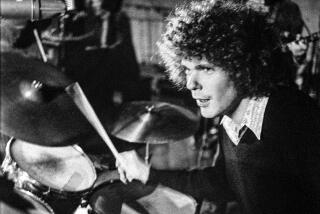‘American Masters’ outlines father of funk’s dizzying life
- Share via
The story of James Brown, told in tonight’s installment of PBS’ “American Masters” series (9:30 p.m., KCET), is pretty riveting even without considering his place as one of the biggest musical innovators of postwar popular music.
Here’s a kid who grew up essentially parentless in the rural South, living among 18 people in a house of prostitution that was run by an aunt, who nevertheless went on to massive success in his chosen field, overseeing many aspects of that career himself -- only to wind up a fugitive from the law and, at one point, a participant in an extraordinary interstate car chase that ended with a prison term after police shot out the tires of the vehicle in which he was fleeing.
It’s not, however, the lurid, tabloid-ready elements that make his life worth examining, but rather the way Brown carved out a path in pop music that addressed the harsh realities of racism for African Americans and brought African-based polyrhythms into pop music in such a forceful way as to lay the foundation for what would become funk music.
Outside of his music, he put his money where that extraordinary mouth was, funding scholarships for children in Augusta, Ga., his longtime home.
“On a regular basis he goes through these streets and makes sure the kids have money, and [that they] take money to their parents, gives them bicycles,” says wife Tommy Rae Brown. “He just doesn’t forget where he comes from.”
One odd aspect of this documentary, assembled to mark Brown’s 70th birthday this year, is the reading of excerpts of his autobiography by actor Clarke Peters. That device may be related to reports of discussions about using subtitles during Brown’s own interview portions, because extensive dental work he’s undergone over the years -- part of his belief that an entertainer’s two most important assets are his hair and teeth -- have created enunciation difficulties. The producers decided against subtitles, but it makes for challenging listening at times. But there’s no misunderstanding the power of such hits as “It’s a Man’s Man’s Man’s World,” “Cold Sweat” and “Papa’s Got a Brand New Bag” that are shown with vintage film of his eye-popping stage performances in the ‘60s, performances that resonated far beyond the dance floor.
“Funk, like soul before it, came from the roots of black music,” Peters reads from Brown’s book. “It’s about being proud of yourself, and your people.”
More to Read
The complete guide to home viewing
Get Screen Gab for everything about the TV shows and streaming movies everyone’s talking about.
You may occasionally receive promotional content from the Los Angeles Times.






